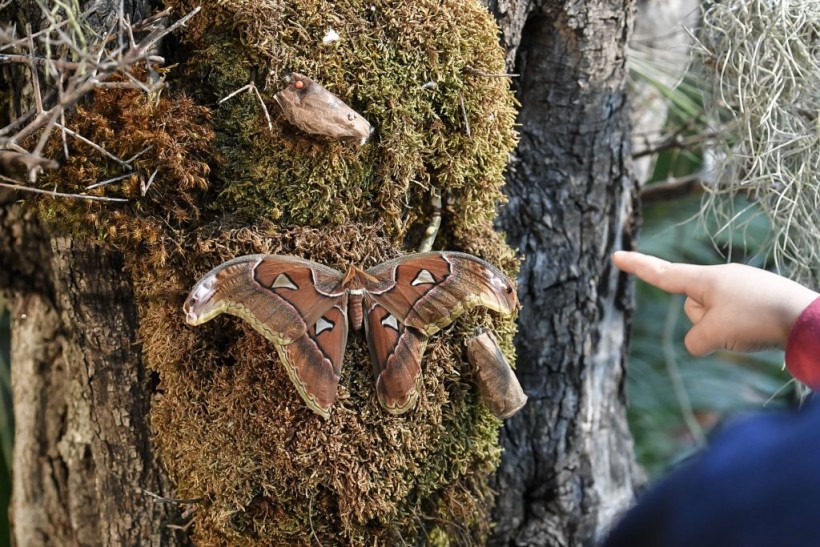Customs and Border Protection (CBP) officials found moth species and larvae hidden into seeds in a traveler's luggage at Detroit Metro Airport in Detroit, Michigan. Officers were startled after the discovery since the moths had not been spotted in the United States for more than 100 years.
The event adds to U.S. customs authorities' continuous efforts to combat the so-called practice of "bug smuggling" or "insect trafficking" into the country from various sites worldwide. Previous reports claim that these actions are part of an illegal trading enterprise.

A visitor points to a moth during the 'Tea with Butterflies' exhibition at the SET (Tirso Event Space) in central Rome on February 9, 2018. Hundreds of tropical and native butterflies fly in a 500 sqm garden where a specific ecosystem has been created, to allow people to relax by having a cup of tea, while discovering the magnificent world of multicoloured wings moths.
Specialists Find Moths Not Seen in the U.S. Since 1921
CBP agricultural specialists at the Detroit Metro Airport discovered the moth species after screening an arriving passenger from the Philippines in September 2021. The anonymous passenger claimed the pods, with supposed insect escape holes, are used for medicinal tea.
According to The Detroit News, CBP inspectors seized moth larvae and pupae for investigation, where some hatched, showing moths coated in patches of "black setae" or "bristles" that resembled members of the Pyralidae animal family.
Following the surprise finding, an etymologist from the Smithsonian Institution of the United States Department of Agriculture (USDA) verified that it was the first time the moth species had been encountered since it was first described in 1912.
The USDA etymologist also stated that it was the first time such larvae or pupae of the moth had been recovered. After failing to determine the insects' particular categories, the CBP referred the moths to the USDA.
USDA's Animal and Plant Health Inspection Service (APHIS) said incoming passengers entering the country must disclose all agricultural goods, including animals, meats, poultry, shellfish, plants, fruits, vegetables, seeds, and soil.
The declaration that a passenger must fill out on the U.S. Customs Declaration Form also includes animal and plant-based commodities. Furthermore, the majority of the agricultural commodities specified are either limited or illegal.
Agricultural Risks
Identifying the moth species during an examination at the Detroit Met
Identifying the moth species during an examination at the Detroit Metro Airport is one of the steps the U.S. government takes to combat the spread of illness brought by foreign pests.
U.S. Port Director Robert Larkin claimed that the discovery is proof of the country's ongoing goal to identify foreign pests and preserve America's natural resources, USA Today reported.
APHIS also underlines that the increased security is intended to safeguard American agriculture and the environment. In the worst-case scenario, a large pest or disease epidemic, according to the U.S. agriculture department, may result in food shortages, higher grocery expenditures, and agricultural losses impacting farmers and ranchers.
Over the last century, certain insect species in the United States have been documented to have originated in other nations, including Europe and Asia. A lot of these invasions resulted from unlawful commerce, such as the bug smuggling and insect trafficking noted previously.
RELATED ARTICLE: Worm Found Swimming in KFC Soft Drink; Customer Complains Feeling Sick After Drinking
Check out more news and information on Agriculture in Science Times.














